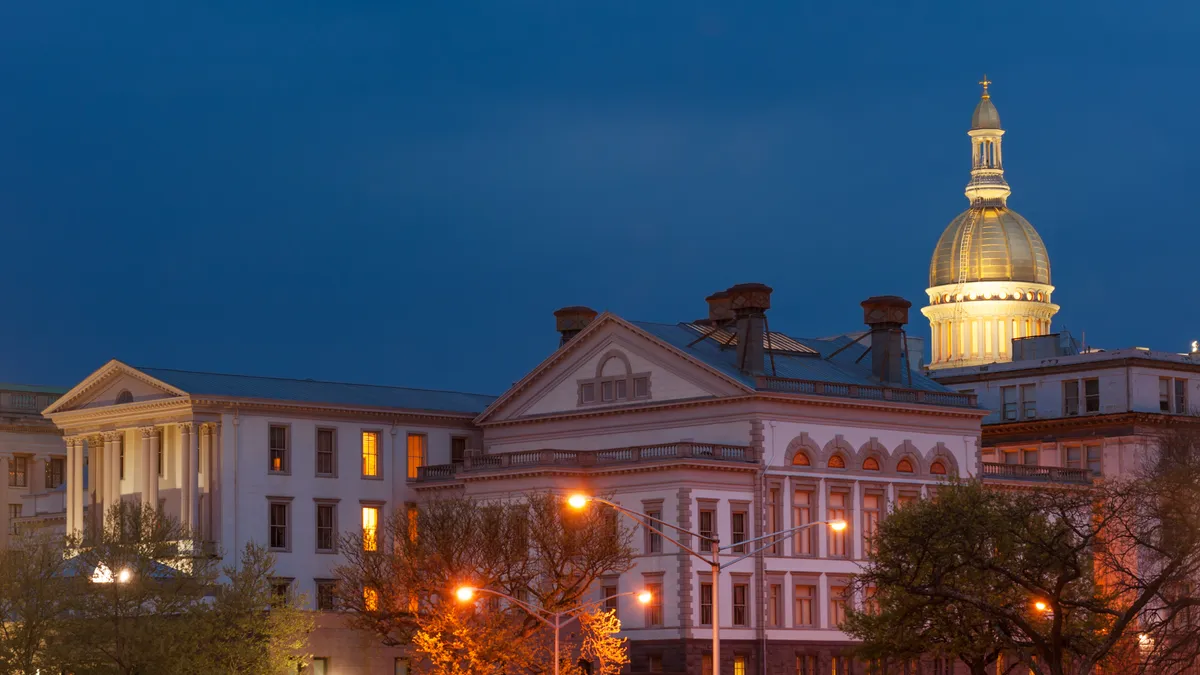Dive Brief:
- New Jersey failed to rise this year from its bottom rank in business taxation as a tangle of levies hobbled its competitiveness with other states, the Tax Foundation said. New York and California were ranked 49th and 48th, respectively.
- New Jersey “is hampered by some of the highest property tax burdens in the country, has the highest-rate corporate income taxes in the country and has one of the highest-rate individual income taxes,” the Tax Foundation said. The Garden State also “has a particularly aggressive treatment of international income, levies an inheritance tax and maintains some of the nation’s worst-structured individual income taxes.”
- Wyoming ranked No. 1 in the Tax Foundation’s State Business Tax Climate Index. The Cowboy State has held the top spot since 2014 and, like South Dakota, imposes neither a corporate tax nor an individual income tax.
Dive Insight:
When ranking the 50 states, the Tax Foundation weighs 120 variables among five major types of levies, including individual income tax, sales tax, corporate income tax, property tax and unemployment insurance tax.
Business taxes influence decisions such as plant location and job creation and retention, the Tax Foundation said. The levies erode profits, imposing costs on consumers through higher prices, employees through lower wages or fewer jobs, and shareholders through lower dividends or share value.
“States with the best tax systems will be the most competitive at attracting new businesses and most effective at generating economic and employment growth,” the Tax Foundation said. “Unlike changes to a state’s health care, transportation or education systems — which can take decades to implement — changes to the tax code quickly improve a state’s business climate.”
Lawmakers often seek to ease a state tax burden by offering specific companies tax incentives rather than by reducing the broader tax burden, the Tax Foundation said.
“Lawmakers make these deals under the banner of job creation and economic development, but the truth is that if a state needs to offer such packages it is most likely covering for an undesirable business tax climate,” the Tax Foundation said.
Many state officials also erroneously believe that other countries pose the sharpest competition for attracting businesses, the Tax Foundation said. Yet a state is more likely to lose jobs to another state rather than to a foreign country.
“State lawmakers must be aware of how their states’ business climates match up against their immediate neighbors and to other regional competitor states,” the Tax Foundation said.
Massachusetts since last year fell in the rankings more than any other state, sliding 12 places to 46, the Tax Foundation said.
The Bay State amended its constitution last November to move from a single-rate to a graduated-rate income tax. The state imposed a 4% surtax on income exceeding $1 million, raising the top marginal individual income tax rate to 9% from 5%.
New Jersey may rise from dead last in corporate tax rankings if a 2.5% business tax surcharge expires at the end of 2023 as scheduled, the Tax Foundation said. The change would reduce the state’s top marginal corporate income tax rate to 9% from 11.5%.
“If the surcharge is indeed allowed to expire, New Jersey’s corporate tax component score will improve in the future,” according to the Tax Foundation.












